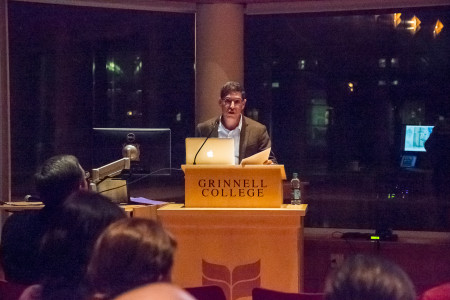
Karan Dhingra
dhingram@grinnell.edu
University of California, Davis historian Michael Saler visited JRC 101 last Wednesday to talk about virtual reality and imaginary worlds. Saler’s discussion on the minds of fans of science fiction and fantasy fit well with the Center of Humanities’ theme of the year—“Sites of Creativity: Streets, Salons, Studios and Schools.”
“[The talk] is of special interest to, among others, students of history and anybody who is interested in worlds of fantasy,” said Professor Shuchi Kapila, English, who was instrumental in bringing Saler to Grinnell.
Saler considers fandom to be a historical phenomenon worthy of investigation. He contends that the turn of the 20th century saw the emergence of a peculiarly modern kind of fandom in which fans attributed reality to characters they knew to be fictional.
“Sherlock Holmes fans thought Sherlock Holmes was real and Arthur Conan Doyle was fictional,” Saler said at the talk, scrolling through pictures of “biographies” of Holmes (replete with footnotes, he made sure to notice) written at the turn of the 20th century.
A professor of modern European culture, Saler cited sociology, philosophy and psychology in order to substantiate the view that at the end of the 19th century, the West became disenchanted by a world now explained by modern science.
“In a world where instrumental rationality had displaced religion, people began to inhabit imaginary worlds in a way previously unheard of,” he said. Saler calls this phenomenon “disenchantment enchantment.”
Saler explained that in their efforts to enchant the world around them that had been sapped of myths and religion, fans exercised their creativity and imagination in ways that would be considered dangerous in a previous age.
“I think it is a mistake to consider imaginary worlds as merely escapist,” Saler explained. Saler thinks that fictionally constructed worlds, with their own histories, geographies and incredibly detailed maps, can serve as safe venues to discuss contentious real world issues.
“It is easier to talk about immigration in the context of the Shire than in the context of the United States of America.”
Saler’s research also has particular implications for the various questions that modern technology brings to virtual reality. Saler is optimistic and thinks that virtual technology will allow users to do more with what they have been always been doing as fans of fantasy and science fiction: immerse themselves into fictionally-created worlds.
There is still a danger, Saler recognizes, of letting imagination getting out of hand and blurring the line between fantasy and reality. Yet his so-called “fictionalist” stance does not preclude the existence of essential truths. To mark every sentence with an asterisk, to exercise the imagination and wonder whether it really holds and what would happen if it did not, is what Saler thinks inhabiting imaginary worlds prepares us to do.
Faculty members and students alike received the talk with much interest. An interesting discussion ensued, which included both serious questions about when exactly fandoms emerged and droll remarks about the place of J.R.R Tolkien in the British literary canon. The variety of inquiries highlighted how far-reaching Saler’s research truly is.



















































